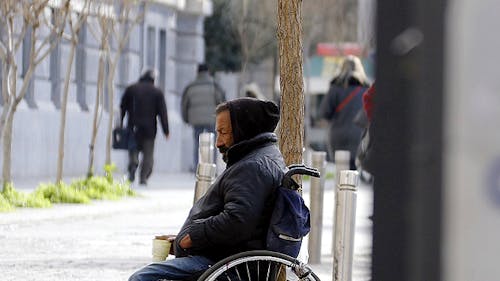Rutgers transportation specialists train special education students

While many University students can become frustrated by the campus-wide bus system, special education students are using them to learn about mass transit both inside and outside the Garden State.
The New Jersey Travel Independence Program (NJTIP) at Rutgers is partnering with Middlesex County Vocational and Technical Schools (MCVTS) to train special education students to feel more comfortable using public transportation to get from place to place.
Students are travel-trained through sessions in class and out of class, said Louis Hoffman, program manager and travel instructor at the New Jersey Travel Independence Program at the University.
“Two of the methods that we use are classroom and experiential sessions with students,” he said. “We do real-time training in many different aspects of (transportation).”
It is important for students to learn how to use mass transit at their own pace before being expected to understand it as adults, Hoffman said.
“As students who (might not) be used to traveling with the general public, it’s important for them to learn while they are on campus, before they are thrown out into a new environment,” he said.
Travel training allows students to learn the safest, most direct way of getting to a workplace of leisure activity site, said Tracey Maccia, director of Special Services at Middlesex County Vocational and Technical Schools.
Working in collaboration with Hoffman allows the special education students to learn in real-time with NJ Transit buses and trains, as well as Rutgers buses, Maccia said.
“He’s customized two programs for us,” she said. “We’re using some of the Rutgers buses to get around … New Brunswick, which is the hub of all the transportation. Once you’re in New Brunswick, you can get anywhere in New Jersey.”
Along with educating students about how to actually use mass transit, Hoffman is also teaching them practical habits with time management, such as getting to the bus stop or train station 15 minutes early, Maccia said.
The program also teaches students social practices such as bus etiquette, not talking loudly on the phone or playing loud music, she said.
“I think we’re really opening up the kids’ worlds a little bit,” she said. “It’s not just within their world … we’re reaching out to their communities, to the state of New Jersey and also how to travel internationally.”
Travel training targets students entering a transitional period to adolescence, which normally occurs at age 14, she said.
Having a greater knowledge of mass transit might encourage the students to engage in “healthier” activities, limiting the likelihood of them using drugs and alcohol, Maccia said.
NJTIP and MCVTS hope this experience will empower special education students to go about their day, and use public transportation with a sound familiarity of the basics to ride the bus or train without fear, she said.
Among other features, the Americans With Disabilities Act allows these students request special seating arrangements and stop announcements once they board a bus or train, Hoffman said.
“Some students aren’t going to be able to afford a car, car insurance — some kids can’t even pass the driver’s test,” Maccia said. “This is really opening up avenues for them to expand their accessibility (and) mobility within the community.”
NJTIP trained more than 1,000 individuals to safely and effectively use public buses, trains and other forms of transportation, said Andrea Lubin, senior research specialist at the Edward J. Bloustein School of Planning and Public Policy.
Past research showed that knowledge of mass transit can help individuals assimilate into a community, Lubin said.
“Our research here has really demonstrated time and time again that transportation really (is) a lynchpin in terms of connecting folks to many opportunities,” she said. “Transportation really plays a part … in being a part of the community.”
Travel training is beneficial because it can be applicable to many situations beyond the use of public transportation, such as interviewing for jobs, Hoffman said.
Hoffman said he hopes his trainees will take away a newfound feeling of confidence in their ability to approach public transportation.
“It’ll help them feel more connected so they can reach out to the appropriate facilities,” he said.
Training special education students to feel more at ease with public transportation might allow them to gain a feeling of personal freedom, Maccia said.
“(We’re) giving ... a sense of independence and self-determination for our students with disabilities,” she said.
Dan Corey is a Rutgers Business School first-year student majoring in pre-business and journalism and media studies. He is an Associate News Editor at The Daily Targum. Follow him on Twitter @_dancorey for more stories.



